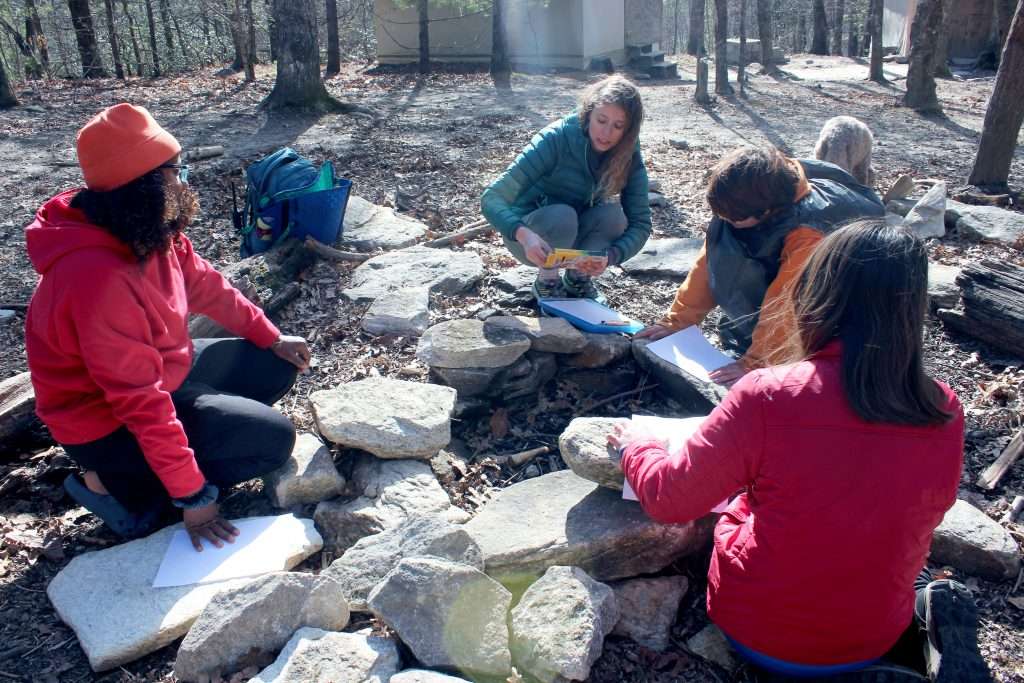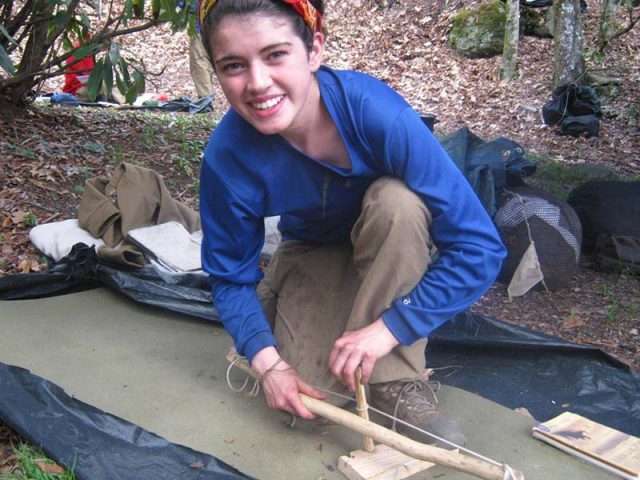Adventure Week: Building Self Confidence
After their time at our Winding Gap base camp, students will spend one week focused on adventure activities exclusively. Over the course of this week, students work through a series of skill development activities, dependent on which adventure activity is highlighted that week.
At the end of the week, students participate in a peak experience that gives students the chance to use the skills they’ve worked on throughout the week in order to accomplish a milestone task.
Through adventure programming, students gain healthy coping skills that they can apply to their daily lives. Adventure programming also provides the opportunity to address some of the underlying causes of behavioral problems outside of traditional talk therapy sessions.
Through activities like hiking and backpacking, students learn how to work through challenges with the support of our staff. Any difficult emotions that arise during these activities can be explored by the student and adventure staff in the moment, providing the opportunity to identify how the stressor is affecting them and grow from the experience.

Skill Building Through Experiential Activities

Adventure activities give students the chance to practice their relationship skills. Some students will gravitate toward leadership roles and learn the qualities of being an effective leader. Other students may need help getting out of their shell, and adventure activities provide them the opportunity to build friendships among their peers. For all of our students, learning how to effectively and appropriately communicate their needs in this setting helps them develop self-advocacy skills.
As students work through their challenges, both mental and physical, they gain the ability to problem-solve. Whether dealing with a literal mountain in front of them, or the thoughts of anxiety in day-to-day life, students learn how to move forward.
The goal of adventure programming is to challenge comfort zones in order to build self-confidence while also improving overall mental and physical health.
Get started today
Contact us today to learn how Trails Carolina can help your family
Trails saved my daughter’s life. Amanda is an amazing human and a brilliant therapist. I am so grateful to her, Science Steve, and the other wonderful people who could reach my daughter at a time when I could not.
Margot Lowman August 2022
Great life changing experience for our son. After becoming addicted to gaming during covid he was very depressed. At Trails he experienced the wilderness, Science Steve, learning survival skills and top notch therapy and support etc… I highly recommend! This gave our son and our family a renewed family bond full of love and excitement about his bright future.
Winnifred Wilson July 2022
Outstanding clinical work and superb staff! There’s a great culture at this company and it shows with how they engage with families/clients.
Kristin Brace June 2022
Why Choose Our Wilderness Therapy Program
Wilderness therapy is a form of therapeutic treatment that combines individual, family, and group therapy driven by accredited mental health professionals with experiential education in a wilderness environment.
We believe that by connecting with nature in a wilderness therapy setting, your child can learn to address their unhealthy behaviors, gain valuable personal insights, and learn important lessons. Free from the distractions and negative influences of everyday life, they can focus on their own personal growth and healing process.
In the wilderness, there are unwritten rules that cannot be broken and offer natural consequences when not followed. For example, if a student refuses to put on a rain jacket when it starts to rain, they will end up drenched and uncomfortable. These rules leave no room to blame authority figures, and foster improved accountability and self-reflection. This is the power of wilderness therapy programs.
Removing a troubled child from the temptations of our fast-paced, plugged-in culture and placing them in a wilderness setting disrupts the cycle of negative behavior. Wilderness therapy programs provide an excellent therapeutic environment and educational setting that encourages growth and change.
Though much of our day-to-day lives are removed from nature, humans crave a connection with nature. For many in this generation, quality time outdoors has been replaced by technology time indoors, but there are numerous therapeutic and healing qualities afforded by a natural setting, which is why wilderness therapy programs are so effective.
Being in nature presents a sense of connectedness, purpose, and belonging. In wilderness therapy programs, students spend time reflecting on past choices, exploring future possibilities and discovering the lessons only nature can teach.
While the wilderness provides many unexpected opportunities for learning and growth, the natural consequences of negative and positive behavior are very predictable. Rather than trying to reward or punish individuals for their behaviors, nature teaches powerful and life-changing lessons absent any judgment.
Over time students in our wilderness therapy programs begin to understand these consequences and take ownership of their actions, leading to greater autonomy and long-term success.
Learning is far more effective in the wilderness. As struggles are encountered, Trails’ trained staff are there to help direct the process and offer insights to students that may not think of on their own. Furthermore, learning alongside peers creates a shared challenge, offering additional learning benefits, support, and the opportunity to practice positive social skills. These same skills seamlessly translate into other group settings, such as the classroom or family unit.
Physical exercise is not only good for the body — it’s also great for the brain!
The psychological benefits of physical exercise are well documented. Regular exercise can help to alleviate the symptoms of anxiety and depression, dramatically improve self-esteem, and encourage an overall positive outlook.
For this reason, outdoor exercise is a daily part of Trails Carolina wilderness therapy programs. While at Trails, students enjoy hikes, equine activities, yoga, and a variety of experiential activities. Trails students push their physical limits while they learn about themselves and gain increased confidence.
